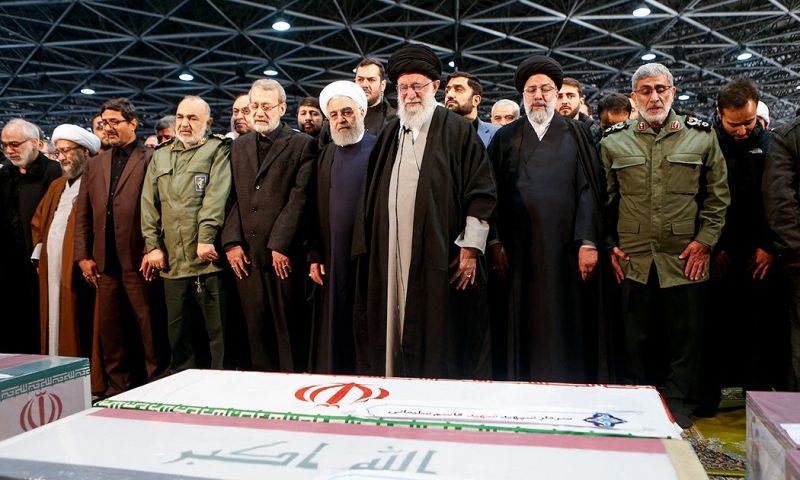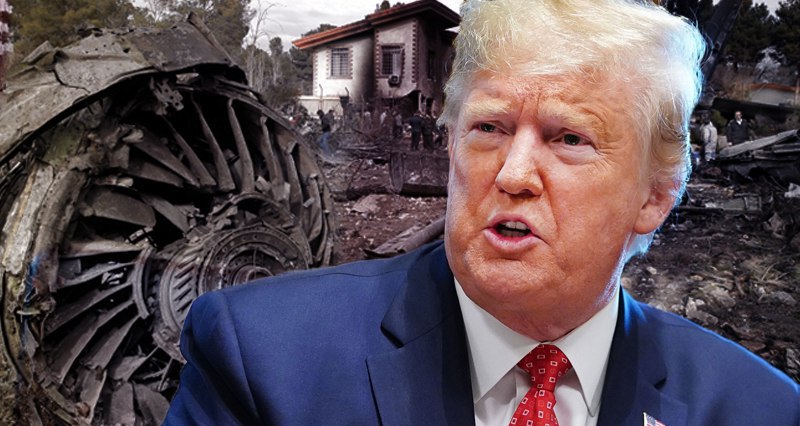An “Unforgivable Mistake”
Ukrainian International Airlines Flight 752 sent shockwaves across the globe upon its crash merely two minutes after taking off from Khomeini International Airport in Tehran. The plane was almost instantly put on display in a video shared throughout social media – engulfed in flames and in rapid descension.
Initial reports from Iranian Civil Aviation suggested technical malfunctions had sent the airliner to its demise. But after another video of a rocket hitting the plane surfaced and as the joint Iranian-Ukrainian investigation progressed, it became clear that Tehran’s air defenses had mistakenly shot the plane down – killing all 176 onboard.
Iran’s leadership, the Iranian people, and most of the world stood devastated in the wake of such a tragic miscalculation. President Hassan Rouhani called it an “unforgivable mistake” and was quick to offer his “sincerest condolences” as well as monetary compensation to the families of the victims, the majority of which were Iranian. A “national tragedy” was declared by Canadian Prime Minister Justin Trudeau, as many of his countrymen also perished in the crash.
But Iran’s Foreign Minister Mohammad Javal Zarif brought the world’s attention to the deeper underlying cause behind the conditions that could have allowed such a tragic mistake to occur – “U.S. Adventurism.”

Pixabay/Joshua_Willson
The Murder of Qassem Soleimani
Notwithstanding Washington’s usual hostile posture in the region, tensions between the U.S. and Iran have been at an all time high since the Trump Administration began the new year with an airstrike that killed Iranian Quds Commander Major General Qassem Soleimani.
Secretary of State Mike Pompeo sold the murder of a sovereign country’s military official to the American people as the dispatching of a terrorist who was an “imminent threat to American lives.”
No evidence to corroborate Pompeo’s statement was provided of course. And to offer even less credence to his claim, Iraq’s Prime Minister later said Soleimani was on a peace mission involving Saudi Arabia – which would undoubtedly have obstructed the U.S.’ objective of isolating Tehran from other countries in the region.
In fact, Soleimani was far from a terrorist. His invaluable contribution to the defeat of ISIS in Syria earned him a heroic reputation – evidenced by the millions across the Middle East who mourned and demanded “harsh retaliation” for his death in the streets.
Indeed, the Iranian government answered the people’s call for revenge – which was delivered in the form of missile strikes against two military bases housing U.S. troops in Iraq.

Wikimedia Commons
Fearing imminent retaliation from U.S. forces, the Islamic Republic was on high alert. Several hours following the strikes and amidst reports that U.S. cruise missiles had been launched at the country, an Iranian missile operator spotted what he perceived to be a projectile heading directly towards a military installation.
The operator had 10 seconds to determine whether or not to fire, as radio communication with his headquarters was severed. In a split second decision, what turned out to be the Ukrainian airliner was blown out of the sky.
Such a terrible mistake undoubtedly would have been impossible if it were not for Washington’s constant harassment of Iran from neighboring Iraq. And while there’s no known evidence to suggest U.S. forces orchestrated the situation, its outcome certainly played right into their foreign policy objectives for the region.
Agenda of Regime Change
One can only speculate as to how the Iranian people would have reacted if its leaders refused to apologize for their mistake and didn’t “care what the facts [were]” as George H.W. Bush said in 1988, when the U.S. Navy shot down an Iranian airliner in error and killed 290 people.
However, we do know that the Iranian government’s admission of its mistake and profuse apologies were not enough to prevent the opposition from flooding onto the streets in protest, demanding the resignation of “hardliner” Supreme Leader Ali Khamenei.
And as is the case with all any protest in Iran, it wasn’t long before Washington’s vultures seized the opportunity to strike where the government was vulnerable.
Donald Trump has already made several tweets supportive of the protests in Farsi, calling the protesters courageous and offering his assurance that the “administration stands with you.”
Trump’s former war-hawk National Security Advisor John Bolton bluntly echoed the President’s sentiment, tweeting “Regime change is in the air. The people of Iran can see it.”
At the same time, Instagram and Facebook have begun removing content that doesn’t label the deceased Soleimani a terrorist – marching in step with new sanctions against Iran and allowing Washington greater control over how Iranians think the rest of the world perceives them.
It’s no accident that the current administration’s increased hostility to Iran comes in the final year of Donald Trump’s presidency. By censoring Americans who dissent to Washington’s wrongful labeling of foreign military officials as terrorists, the Trump Administration has revived an old narrative from George W. Bush’s Presidency – “you’re either with us or you’re with the terrorists.”
Convincing the American people of this dichotomy and, simultaneously, shoving Iran in the direction of regime change would no doubt significantly improve Trump’s likelihood of reelection. The cost of that cheap vote accumulation, however, could very well be another costly and bloody war like Iraq in 2001.
Or perhaps Vietnam in 1965.

















Leave a Reply